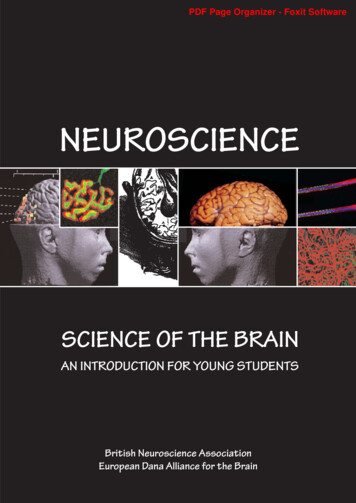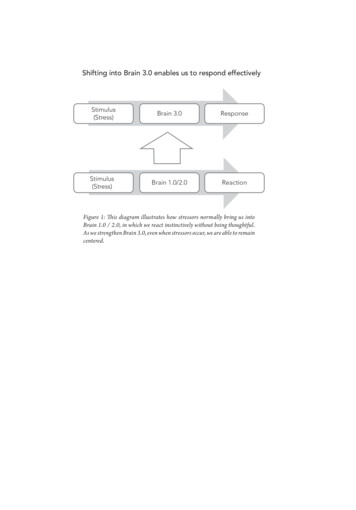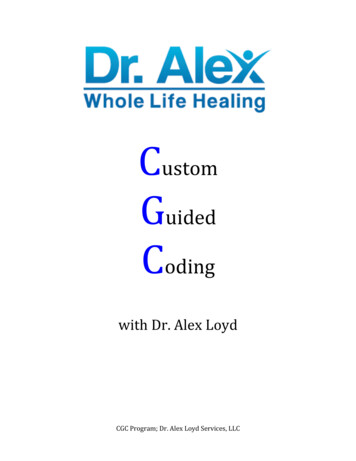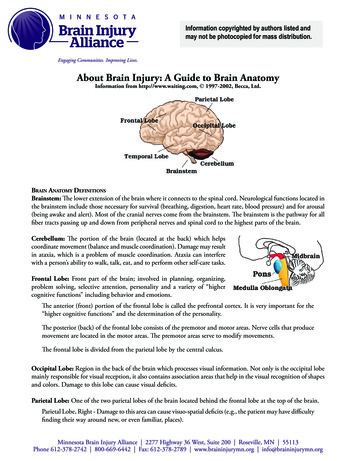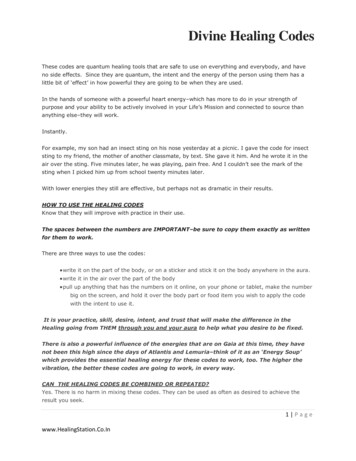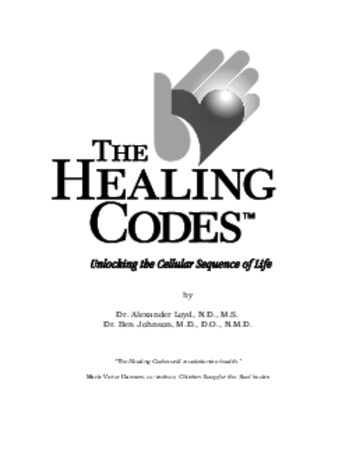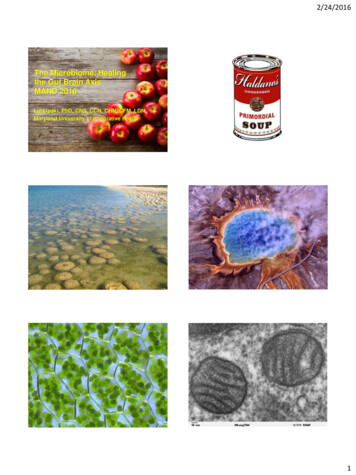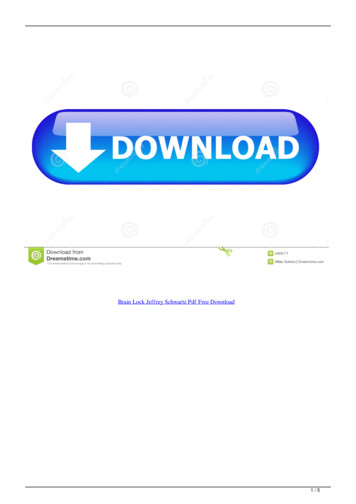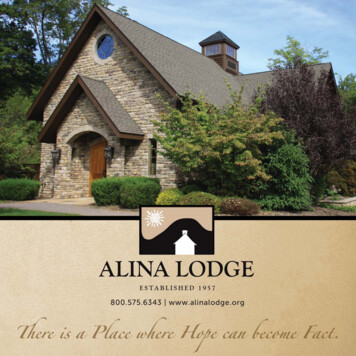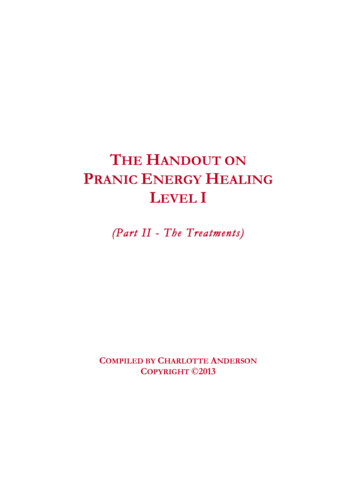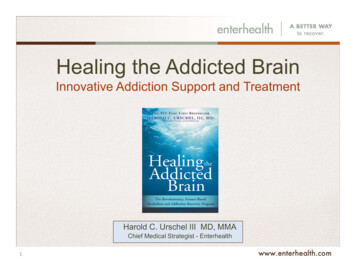
Transcription
Healing the Addicted BrainInnovative Addiction Support and TreatmentHarold C. Urschel III MD, MMAChief Medical Strategist - Enterhealth1
Credentials2 Author of The New York Times best seller, Healing the Addicted Brain Board certified in addiction and general psychiatry by the AmericanBoard of Medical Specialties Published work in the areas of opiate dependence, alcoholdependence, cocaine dependence and anti-addiction medications Education: Cum Laude with a Bachelor of Arts in Neuropsychology from Princeton University Doctorate of Medicine degree from the University of Texas Southwestern MedicalSchool Clinical research fellowship at the University of Pennsylvania/Veteran's AdministrationMedical Center Masters of Management Administration degree from Stanford University GraduateSchool of Business
Enterhealth Overview3 Enterhealth is a premier addiction disease management company inDallas, TX. Operates Residential and Outpatient treatment facilities Board Certified doctors, psychiatrists and therapists specializing inaddiction treatments are on-site 24 hours-a-day Round-the-clock, specially trained nurses Withdrawal Stabilization (detox) capabilities Neurological testing and treatments Anti-addiction medications Dual diagnosis Mission: To deliver a Continuum of Care using the latest scientificprotocols and medical breakthroughs to block the effects of alcoholand drugs, lessen the affects of withdrawal, and decrease cravings sothat the brain’s neurological pathways have a chance to heal.
Agenda 4The Science of Alcohol and Drug AddictionLeading drug classes of abuse Alcohol, Marijuana & OpiatesAnti-Addiction Medication BreakthroughsScience-Based TreatmentWrap up/Q&A
Addiction is a Brain Disease5
Addiction is a DiseaseWhy has drug and alcohol abuse been labeled as achronic medical disease?Think of addiction like another disease, cancer: 6It is deadly if you get it and do not get treatedIf you do get proper treatment, it could still come backIt is similar to other diseases (Asthma, Diabetes, High BloodPressure) that have to be managed throughout our lives
The Brain Cell (Neuron)ReferenceNational Institute of Drug Abuse. Drugs, brains, and behavior. The science of addiction. National Institutes of Health. NIH Pub No. 10‐5605.Available at: ddiction.pdf. Last updated August 2010.7
Synapse: Where the Action isReferenceNational Institute of Drug Abuse. Drugs, brains, and behavior. The science of addiction. National Institutes of Health. NIH Pub No. 10‐5605.Available at: ddiction.pdf. Last updated August 2010.8
The Brain is Vulnerable9 Research shows that alcohol and drug abuse causesa significant negative impact to the memory center ofthe brain Using drugs and alcohol disrupts the brain inunhealthy ways, making it harder to cope with socialsituations and the normal pressures of life The brain’s reward circuits (the dopamine system) getdamaged when individuals are under the influenceand repeat use magnifies the problem and makes itharder to stop
Brain NeuroscienceDrug and Alcohol use creates profound changesin brain metabolism.Normal brainUndersidesurfaceFront on surfaceRight side surface38 year old male with 17 years of heavy weekendalcohol use marked overall decreased activitySPECT images courtesy of D.G. Amen, MD.10
Brain NeurosciencefMRI images of brain’s reward system demonstratehow the brain reacts to environmental triggers.– Social drinkers– Neutral cues vs. Alcohol cues– Alcohol dependent (non-treatment seeking)Social DrinkersAlcohol DependentIndividualsMyrick, Anton, Li et al., Archives of General Psychiatry, April 200811
Comprehensive TreatmentAddiction requires a multi-dimensional treatmentapproach to help sustain long-term sobriety.CortexRole: Decision Making Thinking Reasoning RationalizingTherapy:– Individual, Family, Group– AA / 12-step Fellowships– Faith-based Guidance and Support– Trauma, Stress Management– Nutrition and Wellness12Limbic RegionRole: Drive generationTherapy:– Anti-addiction medication(as needed)– Dual disorder medication(as needed)
Dual DisordersTypically, substance abuse is the result of or apart of other behavioral health disorders. 13Depression (50 – 75% of alcoholics)Anxiety DisordersBipolar DisordersSchizophreniaADD/ADHD
A Complex DisorderNeurobiologicaldysregulation should betreated withpharmacotherapyNutritional deficitsshould be treatedwith dietaryimprovements albehavior should beaddressed withpsychosocialinterventions
Frequent Expectations of AlcoholismTreatment 15Addiction is an acute condition that should beeffectively treated with detoxificationTreatment is expected to produce lasting reductionin symptoms following termination of treatmentRelapse after treatment is often considered atreatment failureTreatment doesn’t work
Top Addictive SubstancesAlcohol, Marijuana & Painkillers16
Alcohol17
Little Known Statistics Alcoholism is the third leading disease causingdeath in the US behind cancer and heart disease Over 100,000 Americans a year die from alcoholAlcohol and drug problems are the second mostcommon mental disorder (6-7% of all adults)Approximately 50% of the risk is attributed togenetics Genetic factors in combination with other biological orenvironmental factors Alcoholism may arise without any apparent family history ofdependence; caused by environmental or interpersonal factors 18Most hospital healthcare systems do not havetreatment programs for alcohol and drug addiction
Brain ActivityAlcohol drinking markedly reduces brain metabolismSource: National Institute on Alcohol Abuse and Alcoholism. Dec 200819
Impact of Chronic Alcohol UseAltered brain cell function1Reduced brain size1Short-term memory loss4Increased cancer risk,especially cancer of the oralcavity, pharynx, esophagus,and larynx2Immune system disorders4Cardiovascular disease3Liver cirrhosis4Altered blood sugar levels4Weakness and breakdown ofmuscle3Reduced pain perception4Bones predisposed to fracture5References:1. Oscar-Berman M, et al. Alcohol Res Health. 2003;27:125-133.2. Bagnardi V, et al. Alcohol Res Health. 2001;25:263-270.3. Mukamal KJ, et al. Alcohol Res Health. 2001;25:255-261.4. National Institute on Aging. AgePage: alcohol use and abuse. Available .asp. Accessed April 4, 2007.5. Turner RT. Alcohol Clin Exp Res. 2000;24:1693-1701.20
Medications for Alcohol DependenceAntabuse ReVia Campral VIVITROL (disulfiram)1(naltrexone)(acamprosate)3(naltrexone forextended-releaseinjectable suspension)430 tabs/month*(1 tab/day)30 tabs/month*(1 tab/day)180 tabs/month*(2 tabs, 3x/day)1/month1951219941. Antabuse full Prescribing Information. Odyssey Pharmaceuticals, Inc.2. ReVia full Prescribing Information. Duramed Pharmaceuticals, Inc.3. Campral full Prescribing Information. Merck Santé s.a.s.4. VIVITROL full Prescribing Information. Alkermes, Inc.2120042006
Vivitrol22
Medications for Alcohol Recovery Vivitrol* (380 mg/month) Campral* (2gm/day)Naltrexone (50mg/day)Antabuse (250mg/day)BaclofenAbility (up to 10-15mg/day)Topomax (200-300mg/day)Ondansetron*Highly recommended for every alcoholic23
Effects of Alcohol on Brain CircuitsGABA and Glutamate Systems: Increase the effects of GABA, the major inhibitoryneurotransmitter in the brain Inhibit the effects of glutamate, the major excitatoryneurotransmitter in the brain Contribute to decreased anxiety and increasedsedation during acute alcohol intake24
Acamprosate Dosage and Administration Initiate as soon as possible after alcohol withdrawalwhen a patient achieves abstinence Maintain treatment if patient relapses Recommended dose: two 333mg tablets takenthree times a day After 2 weeks change to three tabs BID Patients with moderate renal impairment* shouldhave a starting dose of 1 x 333mg, 3 times daily Can be taken with or without meals25
Treatment of AlcoholismThe number of Americans who seek help for alcoholaddiction significantly trails other betesAlcohol Dependence010203040506070% of Recommended Care Delivered268090McGlynn et al. (2003). NEJM, 348: 2635McLellan et al. (2000). JAMA, 284: 1689
Marijuana27
MarijuanaPot is addicting!!!!!!!!!! 28Often called pot, grass, reefer, weed, Mary Jane, or MJ— Marijuanais a mixture of dried, shredded leaves, stems, seeds, and flowers ofCannabis sativa—the hemp plantThere are 250 different substances in MJ smoke THC is only one of themThe THC from just one joint takes 7 days to get out of the body (42days to get out completely if used daily)MJ withdrawal starts 3 weeks after the last dose Withdrawal side affects include: irritability, insomnia, decreasedappetite, increased aggression and cravingsMJ is a gateway drug
MarijuanaPot is dangerous and impairs cognitive ability! The smoke from a MJ cigarette (joint) is 4 times MOREcarcinogenic than the smoke from a cigaretteHeart attack risk - MJ increases heart rate by 20-100% MJ’s negative impact on learning can last for days or evenweeks after the high and relaxation wear offMJ use impairs physical and mental health, cognitiveabilities, social life and career statusMJ injures brain functioning 295-fold increase in risk within the first hour after smokingImpaired short-term memory, drivingDifficulty with complex tasks and learningPoor decision-making, risky behavior
Medications to Treat MJ Dependence No specific anti-addition medications have beendeveloped specifically for MJ Medication options that can reduce anxiety andenhance sleep (that have no addictive potential) 30Many candidates are currently in research trialsQuetiapine (Seroquel)Trazodone (Desyrel)Hydroxyzine (Vistaril)SSRI’s and SNRI’s
Generation Rx: The Opioid Epidemic31
Illicit Prescription Opioid UseOver 2 million people in the US are opioid dependent. 80% are addicted to pain relievers (Morphene, Oxycodone, etc.)20% are addicted to HeroinAnnual Numbers of New Non‐medical Usersof Prescription Medications (18 years )References: Substance Abuse and Mental Health Services Administration. (2002). Results from the 2001 National Survey on Drug Use and HealthNational Findings (Office of Applied Studies), Rockville, MD.3232
Medications to Manage DependenceMedications often used to manage Opioid addiction. 33Suboxone (buprenorphine/naloxone)Vivitrol (extended-release, injectable naltrexone)NaltrexoneMethadone
Benefits of Suboxone 34Removes cravings within 3 daysIf you use heroin or pain pills you can’t feel theireffectsIf you take too much you are punishedSafer: Less likelihood of overdoseThe perfect solution for narcotic addiction whenused with a comprehensive treatment program
Opioids & “Agonists”OpioidsOpioid moleculeattaching to a receptorOpioid receptorReferenceNational Institute of Drug Abuse. Drugs, brains, and behavior. The science of addiction. National Institutes of Health. NIH Pub No. 10‐5605.Available at: ddiction.pdf. Last updated August 2010.35
Opioid Blockers aka “Antagonists”OpioidsOpioid Blocker or“Antagonist”Opioid receptor36
Buprenorphine Binding Opioid ReceptorsZubieta et al., 200037
Vivitrol for Opiate Dependence 38Vivitrol approved in October 2010 for OpiateDependence by FDAAll of the same benefits as in Alcohol Dependence Reduces urge to use Heroin/Pills Blocks euphoria Decreases severity of relapseNeed to be off opiates for 10-14 days before firstinjection
It is time to embrace a multi-dimensionalapproach to fighting drug and alcoholaddiction.39
How is the Approach Different?The approach brings the best of what works inrecovery to help the individual and family. 4012 Step/Faith-based Spiritual SupportIndividual, Group and Family TherapyPsychiatric Testing, Evaluation and TreatmentAnti-addiction Medications (if needed)Nutrition and Wellness CounselingLife Care and Support
How is the Approach Different?Traditional Treatment Model12-StepAAGroup orIndividualTherapyFamilyTherapyPatient41
How is the Approach Different?The Enterhealth ComprehensiveTreatment ModelLife CareTools &SupportWithdrawalStabilization/DetoxWellness &NutritionFaith-basedSpiritualsupportFamily Therapy(Group &Individual)42PatientGroup &IndividualTherapyNeurologicalTesting icalDiseaseAnti-AddictionMedication
Closing Thoughts Alcohol and Drug Addiction is a chronic, medicaldisease of the brain Addiction is a “brain injury” disease It takes 4-12 months of complete sobriety for the brainto heal A comprehensive long-term treatment approach willachieve the best outcomes for clients 43Faith-based Spiritual Support/12-stepIndividual and Family TherapyPsychiatric TreatmentWellness and NutritionMedication
Enterhealth OverviewFor a free copy of Chapter Oneof “Healing the Addicted Brain”,Please visit us at:www.enterhealth.com44
Q&A45
References: Substance Abus e and Mental Health Services Administration. (2002). Results from the 2001 National Survey on Drug Use and Health National Findings (Office of Applied Studies), Rockville, MD. Annual Numbers of New Non‐medical Users of Prescription Medications (18 years
